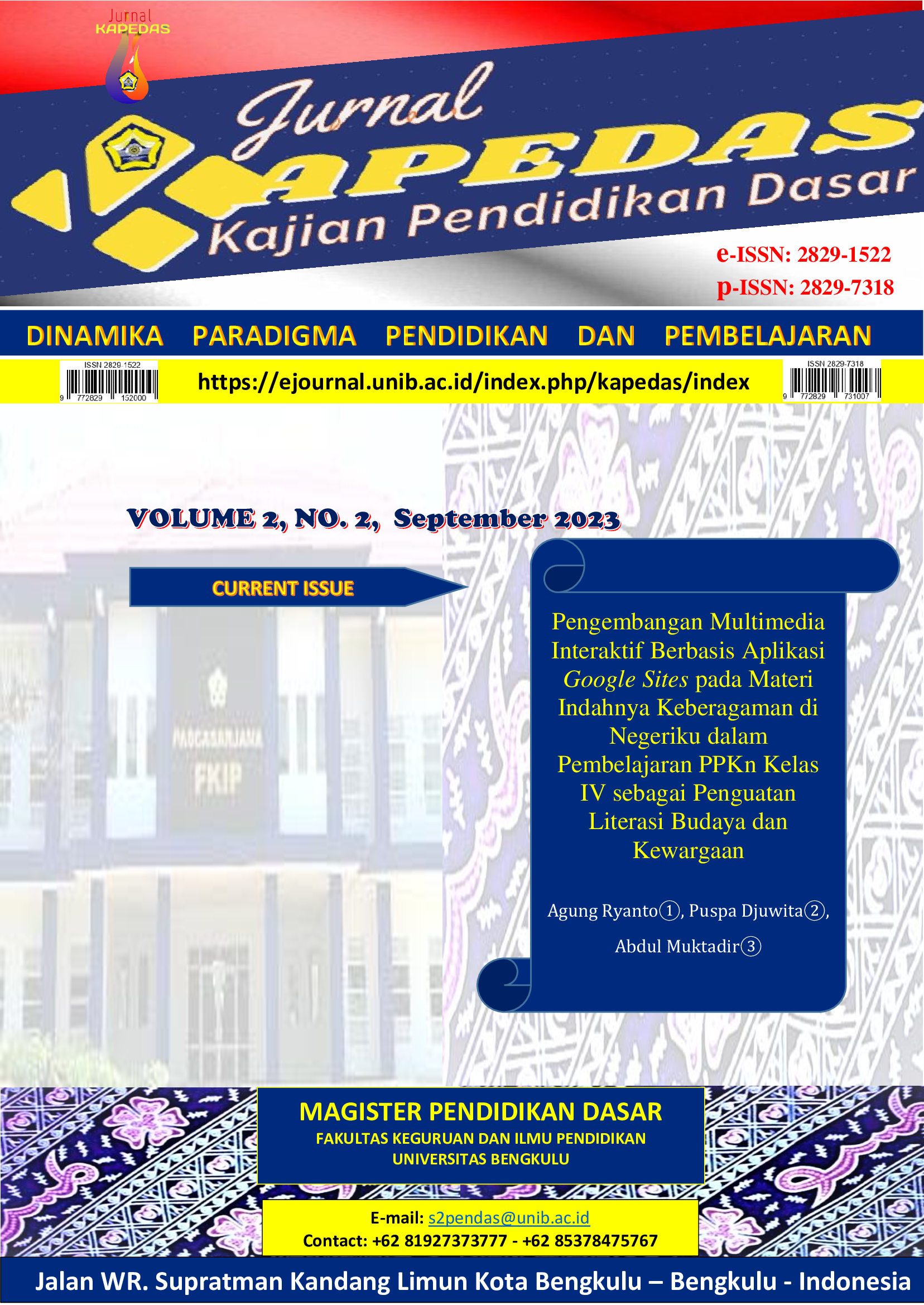Main Article Content
Abstract
The type of research used is quantitative research and the research method used is the correlational method. Correlational research aims to show whether or not there is a relationship between the variables studied by analyzing the affective and cognitive learning outcomes of Civics learning content and social studies learning content. The data analysis technique used is the correlation coefficient technique by correlating the rxy value with the r table value. From the results of the study it is known that there is a correlation/relationship between cognitive - affective learning outcomes in PPKn and IPS content in fifth grade students at SD Negeri Wukirsari. Correlation coefficient (rxy) between tables at a significant level of 5%. Cognitive and affective learning outcomes of PPKn content, rxy¬ = 0.970 > r table 0.05 = 0.320 r table is smaller than rxy and Sig.(2-tailed) 0.000 <0.005 reject Ho accept Ha with a high level of interpretation. Cognitive and affective learning outcomes of IPS content, rxy¬ = 0.871 > r table 0.05 = 0.320 r table is smaller than rxy and Sig.(2-tailed) 0.000 <0.005 reject Ho accept Ha with a high level of interpretation. The affective learning outcomes of PPKn content and IPS content, rxy¬ = 0.983 > r table 0.05 = 0.320 r table is smaller than rxy and Sig.(2-tailed) 0.000 <0.005 reject Ho accept Ha with a high level of interpretation. Cognitive learning outcomes of PPKn content and IPS content, rxy¬ = 0.983 > r table 0.05 = 0.320 r table is smaller than rxy and Sig.(2-tailed) 0.000 < 0.005 reject Ho accept Ha with a high level of interpretation.
Article Details
Copyright (c) 2023 Wartono, Puspa Djuwita, Bambang Parmadi

This work is licensed under a Creative Commons Attribution-ShareAlike 4.0 International License.

Karya ini dilisensikan di bawah Creative Commons Attribution-ShareAlike 4.0 International License .
References
- Aisyah. A.R. (2014). The Implementation Of Character Education Through Contextual Teaching And Learning At Personality Development Unit In The Sriwijaya University Palembang. International Journal of Education and Research, Volume 2.
- Dianti. (2014). Integrasi Pendidikan Karakter Dalam Pembelajaran Pendidikan Kewarganegaraan untuk Mengembangkan Karakter Siswa, Jurnal Pendidikan Ilmu Sosial, Universitas Pendidikan Indonesia, Bandung: Volume 23, No.I, Edesi Juni 2014, e-ISSN 2540-7694, p-ISSN 0854-5251
- Lubis. (2020) Pembelajaran Pendidikan Pancasila dan Kwarganegaraan di SD/MI Peluang dan Tantangan di Era Industri 4,0. Jakarta: Kencana
- Mahananingtyas. (2017). Hasil Belajar Kognitif, Afektif Dan Psikomotor Melalui Penggunaan Jurnal Belajar Bagi Mahasiswa PGSD, Prosiding Seminar Nasional HDPGSDI Wilayah IV Tahun 2017 | ISBN : 978-602-51434-0-3
- Muyono. (2017). “The influence of learning model and learning independence on mathematics learning outcomes by controlling students' early ability”, STKIP PGRI Lubuklinggau, Sumsel: International Electronic Journal of Mathematics Education E-Issn: 1306-3030. 2017, Vol. 12, No. 3, 689-708.
- Sapriya. (2011). Pendidikan IPS. Bandung: PT Remaja Rosadakarya
- Sudjana, N. (2011). Penilaian Hasil Proses Belajar Mengajar. Bandung: PT Remaja Rosydakarya.
- Taurina. (2015). Students’ Motivation and Learning Outcomes: Significant Factors in Internal Study Quality Assurance System. International Journal for CrossDisciplinary Subjects in Education (IJCDSE), Special Issue Volume 5.
- Winarni. (2018b). Teori dan Praktik Penelitian Kuantitatif Kualitatif, Jakarta: Bumi Aksara
- Winarni. (2018). Pendekatan Ilmiah dalam Pembelajaran Kreatif dan Inovatif. Bengkulu: Penerbit FKIP UNIB.
References
Aisyah. A.R. (2014). The Implementation Of Character Education Through Contextual Teaching And Learning At Personality Development Unit In The Sriwijaya University Palembang. International Journal of Education and Research, Volume 2.
Dianti. (2014). Integrasi Pendidikan Karakter Dalam Pembelajaran Pendidikan Kewarganegaraan untuk Mengembangkan Karakter Siswa, Jurnal Pendidikan Ilmu Sosial, Universitas Pendidikan Indonesia, Bandung: Volume 23, No.I, Edesi Juni 2014, e-ISSN 2540-7694, p-ISSN 0854-5251
Lubis. (2020) Pembelajaran Pendidikan Pancasila dan Kwarganegaraan di SD/MI Peluang dan Tantangan di Era Industri 4,0. Jakarta: Kencana
Mahananingtyas. (2017). Hasil Belajar Kognitif, Afektif Dan Psikomotor Melalui Penggunaan Jurnal Belajar Bagi Mahasiswa PGSD, Prosiding Seminar Nasional HDPGSDI Wilayah IV Tahun 2017 | ISBN : 978-602-51434-0-3
Muyono. (2017). “The influence of learning model and learning independence on mathematics learning outcomes by controlling students' early ability”, STKIP PGRI Lubuklinggau, Sumsel: International Electronic Journal of Mathematics Education E-Issn: 1306-3030. 2017, Vol. 12, No. 3, 689-708.
Sapriya. (2011). Pendidikan IPS. Bandung: PT Remaja Rosadakarya
Sudjana, N. (2011). Penilaian Hasil Proses Belajar Mengajar. Bandung: PT Remaja Rosydakarya.
Taurina. (2015). Students’ Motivation and Learning Outcomes: Significant Factors in Internal Study Quality Assurance System. International Journal for CrossDisciplinary Subjects in Education (IJCDSE), Special Issue Volume 5.
Winarni. (2018b). Teori dan Praktik Penelitian Kuantitatif Kualitatif, Jakarta: Bumi Aksara
Winarni. (2018). Pendekatan Ilmiah dalam Pembelajaran Kreatif dan Inovatif. Bengkulu: Penerbit FKIP UNIB.
